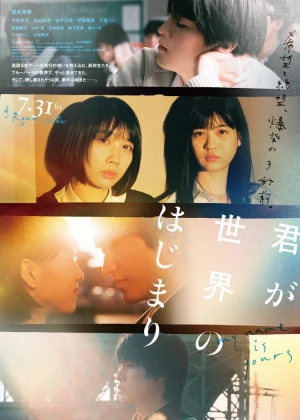My Name Is Yours

After watching Fukuda's My Father the Bride, she immediately jumped up in my ranking. With a fun and distinctive debut like that, I'm more prone to seek out what else they're capable of, but availability often hampers these spirited quests. When My Name Is Yours [Kimi ga Sekai no Hajimari] just happened by, it didn't take me long to leap at the chance. It's Fukuda's second feature film and a considerable departure from her first one. Fans of Japanese coming-of-age dramas should feel right at home, while Fukuda makes sure the film retains a unique signature.
![screencap of My Name Is Yours [Kimi ga Sekai no Hajimari]](/thumbs/img/articles/1200xauto/my-name-yours-1.webp)
Fukuda is part of a group of young female Japanese directors (check the 21st Century Women anthology) who are carving their own path. They tend to work with traditional drama elements while adding their contemporary and personal touches to it, so it's not just a lifeless reiteration of past clichés. It's nice to see there's a new generation waiting to carry on the torch, even though the work of Fukuda isn't quite as novel or disruptive as some of her contemporaries. With her first two films, she has at least proven that she has something valuable to add.
My Name is Yours is a pleasant blend of slice-of-life and coming-of-age drama, with some surprising crime elements mixed in. This setup will no doubt confuse some people, not in the least because Fukuda loves messing around with the narrative structure and doesn't mind floating characters in and out of the story. Once the end credits start rolling down the screen though, everything should be crystal clear and the film will have revealed most of its secrets. The film still gives you plenty to chew on, but it may differ slightly from what you expected.
Em and Kotoko have been friends since childhood, but their bond changes as they grow up and boys start to enter the picture. Kotoko is in love with a soccer player, who shows a bigger interest in Em. Meanwhile, Em has befriended the coolest guy in school, but he has his eyes on Kotoko. As the kids struggle with friendships, romance, and their relationships with their parents, a vile crime is about to shake up the neighborhood. The identity of the criminal remains a mystery, the only thing that is known is that a juvenile stabbed one of their parents.
![screencap of My Name Is Yours [Kimi ga Sekai no Hajimari]](/thumbs/img/articles/1200xauto/my-name-yours-2.webp)
The cinematography is slick and contemporary. The camerawork feels dynamic, and while the film isn't overly colorful, the colors do look very crisp and inviting. Fukuda also uses the editing to great effect to add a distinct visual rhythm, giving extra weight to certain events by slowing things down. My Name Is Yours is not a film that stands out because of its exquisite visuals, but for a drama, it looks much better than the norm. Little details like these help set apart the film and make it stand out in a niche swamped with solid alternatives.
The soundtrack is quite minimal and whatever's there sticks to genre conventions. It is completely absent for most of the film, with Fukuda primarily relying on environmental sounds to set the mood. The little music present is either soft piano diddles or some J-pop band the characters like listening to. It's not music that demands a lot of attention, which isn't that critical for this type of drama, but as always, I would've preferred a score with a bit more identity. It's not that it is actively bad, it's just squandered potential for making a more lasting impression
The cast does an excellent job though, with Honoka Matsumoto in a stand-out role. She isn't technically the main character, as the film regularly skips between the six of them, but because of her performance, she draws the most attention to herself. The rest of the primary cast is solid too, with each actor adding something specific to their character. I have no complaints about the secondary actors either, though they have notably less screen time and fewer opportunities to set themselves apart. But with six principal characters that's only to be expected.
![screencap of My Name Is Yours [Kimi ga Sekai no Hajimari]](/thumbs/img/articles/1200xauto/my-name-yours-3.webp)
Some people expressed a little difficulty keeping the characters apart, due to similar background stories, but I feel the film gives enough clues to keep track of the separate plotlines. I also loved the little trick Fukuda played by adding the crime element through a flash-forward at the very start of the film. I won't spoil too much, but it doesn't quite pan out the way I expected it to, and it has become increasingly rare to find films with effective misdirection. Mind you, not everyone will appreciate Fukuda's little scam, but you have to at least appreciate the bold risk she took.
There is no lack of Japanese dramas, so props to Fukuda for finding a way to make hers stand out. But even without the little narrative twist, this would've been a worthwhile film. The performances are strong, the cinematography is stylish and the pacing is perfect. I love the versatility she showed in her first two films, sadly, availability might be an issue. It doesn't look like she made a big splash on the international scene, and distribution these days is still hugely flawed. These films aren't impossible to find though, so if you come by this one, be sure to give it a fair shot.